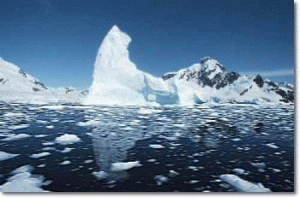Should climate scientists tell the public how dire the climate crisis is -- in particular, whether it threatens to bring civilization to an end in the not-too distant future?
In the August 2015 issue of Esquire, writer John H. Richardson deals with this question in an article entitled, "When the End of Human Civilization Is Your Day Job."
The occasion for this article was a tweet about a year ago by a highly respected climate scientist, glaciologist Jason Box. After reading a report about the discovery of more than 100 new sites in the Arctic where methane is seeping out, he wrote: "If even a small fraction of Arctic sea floor carbon is released to the atmosphere, we're f'd."
Having gone viral, the tweet inspired many headlines, such as: CLIMATOLOGIST: METHANE PLUMES FROM THE ARCTIC MEAN WE'RE SCREWED. Many fellow climate scientists would not disagree with Box's assessment, given the fact that, as a greenhouse gas, methane is much more powerful than carbon dioxide.
(My recent book on climate change, Unprecedented, is subtitled, Can Civilization Survive the CO2 Crisis? But in the chapter discussing "ecosystem collapse and extinction," I pointed out that the book might better have been subtitled, Can Civilization Survive the CO2-CH4 Crisis?)
Although Box's tweet was not out in left field, his new employer did not appreciate his statement. Having left the United States, mainly because of the rampant climate denialism in this country, Box moved to Denmark, where he now works for the Danish government.
The government is very supportive of Box's work, but it did not, in Richardson's words, "take kindly to one of its scientists distressing the populace with visions of global destruction."
Richardson's essay is focused on the internal struggle of Box and other climate scientists with the issue of how to deal psychologically with the devastating climate facts, which their vocation forces them to face daily.
Box tries to block out such facts from affecting his emotional life, saying: "If I spend my energy on despair, I won't be thinking about opportunities to minimize the problem." But he often fails, as he is obsessed with "the human suffering to come" -- an obsession that is intensified by the fact that he has a very young daughter.
How Much to Say, How Frankly?
But I am here focused on a slightly different question: Should climate scientists frankly tell the public just how dire the situation is? On this question, there are differences of opinion within the climate community.
One climate scientist who was angered by Box's tweet was Gavin Schmidt, who now has the position that was long held by the world's best-known climate scientist, James Hansen. Schmidt told Richardson:
"You don't run around saying, 'We're fucked! We're fucked! We're fucked!' It doesn't incentivize anybody to do anything."
In response to Richardson's probing, it became clear that Schmidt agrees that the situation is very serious, saying: "The business-as-usual world that we project is really a totally different planet."
(Note: You can view every article as one long page if you sign up as an Advocate Member, or higher).





